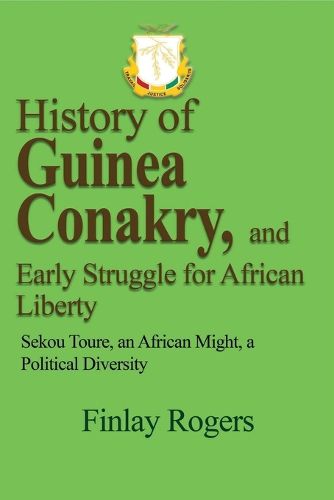Readings Newsletter
Become a Readings Member to make your shopping experience even easier.
Sign in or sign up for free!
You’re not far away from qualifying for FREE standard shipping within Australia
You’ve qualified for FREE standard shipping within Australia
The cart is loading…






This title is printed to order. This book may have been self-published. If so, we cannot guarantee the quality of the content. In the main most books will have gone through the editing process however some may not. We therefore suggest that you be aware of this before ordering this book. If in doubt check either the author or publisher’s details as we are unable to accept any returns unless they are faulty. Please contact us if you have any questions.
History of Guinea Conakry, and Early Struggle for African Liberty. Sekou Toure an African might, a Political diversity. sacred because it must be born in our spirits on the very day that foreign domination takes hold in a country. That is to say that Africa’s vocation for independence is not born today, but on the very day when foreign powers extorted from African populations the right to the total exercise of their own sovereignty………… Ahmed Sekou Toure, Conakry, 26 October 1958On 2 October 1958, Guinea became the first of France’s colonial territories in Sub-Saharan Africa to declare its independence. It did so without having fired a shot, a matter of considerable pride to Guinea’s leaders. However, it also achieved this status against the wishes of its former colonial master and then weathered an administrative and diplomatic assault by France which seemed to the Guineans to have been designed to drive them to their knees. France’s hostility towards the new state one that had come into being lawfully by taking advantage of an offer extended by the metropole was hardly the action of a colonial power responding to its independence without a stumble, as Charles-Robert Ageron asserts. It was all the more mystifying and enraging to Guinea’s leaders because they consistently expressed their desire to maintain the closest possible ties with France
$9.00 standard shipping within Australia
FREE standard shipping within Australia for orders over $100.00
Express & International shipping calculated at checkout
This title is printed to order. This book may have been self-published. If so, we cannot guarantee the quality of the content. In the main most books will have gone through the editing process however some may not. We therefore suggest that you be aware of this before ordering this book. If in doubt check either the author or publisher’s details as we are unable to accept any returns unless they are faulty. Please contact us if you have any questions.
History of Guinea Conakry, and Early Struggle for African Liberty. Sekou Toure an African might, a Political diversity. sacred because it must be born in our spirits on the very day that foreign domination takes hold in a country. That is to say that Africa’s vocation for independence is not born today, but on the very day when foreign powers extorted from African populations the right to the total exercise of their own sovereignty………… Ahmed Sekou Toure, Conakry, 26 October 1958On 2 October 1958, Guinea became the first of France’s colonial territories in Sub-Saharan Africa to declare its independence. It did so without having fired a shot, a matter of considerable pride to Guinea’s leaders. However, it also achieved this status against the wishes of its former colonial master and then weathered an administrative and diplomatic assault by France which seemed to the Guineans to have been designed to drive them to their knees. France’s hostility towards the new state one that had come into being lawfully by taking advantage of an offer extended by the metropole was hardly the action of a colonial power responding to its independence without a stumble, as Charles-Robert Ageron asserts. It was all the more mystifying and enraging to Guinea’s leaders because they consistently expressed their desire to maintain the closest possible ties with France